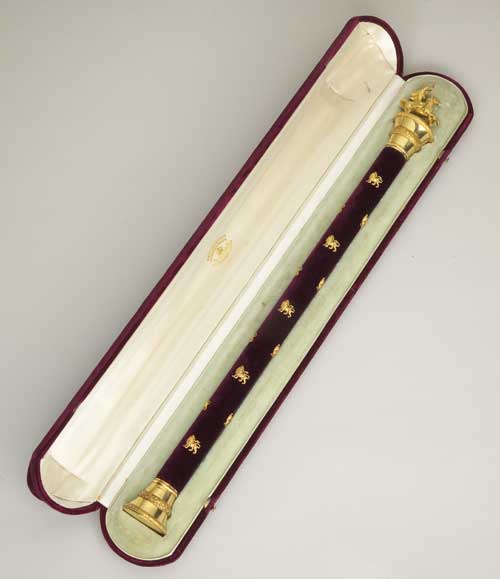
Auction: 4020 - Orders, Decorations, Campaign Medals & Militaria
Lot: 83
The Highly Important Field Marshal's Baton to The Earl of Lucan for His Many Achievments, Including the Command of the Cavalry Division in the Crimea Where he Directed the Movements of the Heavy and Light Brigades at Balaklava The Baton, overall length 55cm. including the 18ct gold top and bottom mounts (Hallmarks for London 1887), is covered in its' original Imperial purple velvet and studded with eighteen gold lions; the base inscribed 'From Her Majesty Alexandrina Queen of the United Kingdom of Great Britain and Ireland to Field Marshal The Right Hon. "The Earl of Lucan G.C.B."; surmounted by a superbly modelled equestrian gold figure of St. George with the dragon, extremely fine in its' original 'Garrard, London' Imperial purple velvet covered case of issue. Estimate £ 50,000-60,000 Field Marshal George Charles Bingham, Third Earl of Lucan, G.C.B. (1800-1888), one of the most celebrated personalities of the Victorian era, born in London and educated at Westminster, entered the British Army as Ensign in the 6th Foot, 1816; in 1818 he became Lieutenant in the 8th Foot, obtained a Company in the 74th Foot in 1820 and two years later was gazetted to the 1st Life Guards; was appointed to the 17th Lancers from as Major in 1825 and rose to the command of that regiment as Lieutenant Colonel the following year. He was present in the Balkan campaign in 1828 attached to the Russian Staff (Order of St. Anne, 2nd Class). From 1826 to 1830 he was M.P. for County Mayo; succeeded as the third Earl of Lucan 30.6.1839 and in the following year was elected a representative peer of Ireland. Appointed Colonel in the army in 1841 and Major General in 1851. On 21.2.1854 Lord Lucan was appointed to the command of the Cavalry Division of the Eastern Army in Turkey - the Heavy Brigade (Colonel Yorke Scarlett) and the Light Brigade (Lord Cardigan). He served in the Crimea with distinction, notably at Balaklava on 25.10.1854 where some two thousand advancing Russian Cavalry were driven back by the brilliant charge of the Heavy Brigade made under Lucan's direction. After defeating and breaking the Russian Cavalry in the morning with less than half their number, he launched the famous 'Charge of the Light Brigade' in the afternoon, in accordance with what seemed to be the reasonable meaning of the Commander-in-Chief Lord Raglan's ambiguous order to advance; 'Lord Raglan wishes the cavalry to advance rapidly to the front and try to prevent the enemy carrying away the guns. Troop of Horse Artillery may accompany. French Cavalry is on your left. Immediate.' All subsequent efforts to prove that Lucan was wrong in his interpretation of that order, to advance 'into the valley of death', failed. During the operations on the 25th October Lord Lucan was wounded in the leg by a bullet. The Light Brigade was reduced from over 600 mounted men to less than 200 and two heavy cavalry regiments were depleted. Lord Lucan vindicated himself in the House of Lords 19.3.1855 and for his services in the Crimea received the Medal with four clasps, the French Legion of Honour, 3rd Class, the Turkish Order of the Medjidie, 1st Class and on 5.7.1855 he was created K.C.B. . Colonel 7th Hussars, November 1855; promoted Lieutenant General 1858 and General 1865; was transferred to the Colonelcy of the 1st Life Guards 1865 and was advanced to G.C.B., 1869. Lord Lucan's achievments were rewarded with his promotion to Field Marshal 21.6.1887. Lord Lucan's baton is one of approximately eight Field Marshals' batons to be offered for sale in the past fifty years.
Sold for
£46,000




